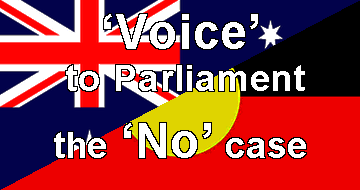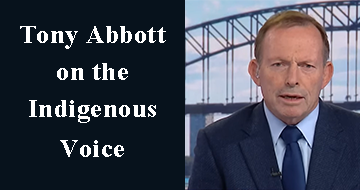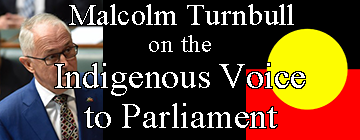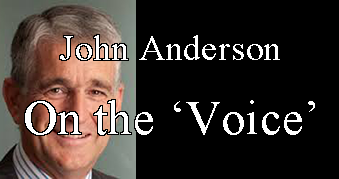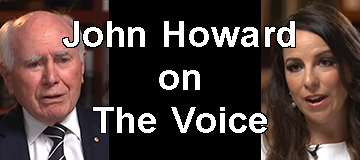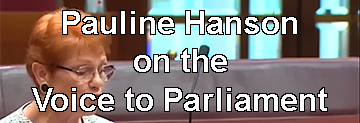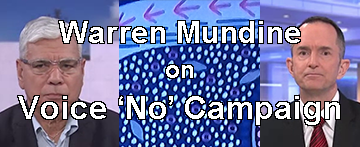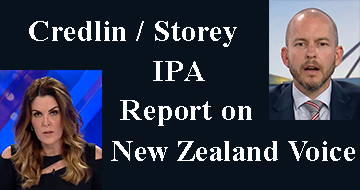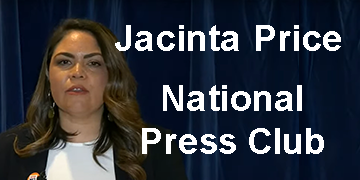A copy of an article posted on medium.com that lists the arguments presented by the major proponents againsts enshrining an Aboriginal voice to Parliament in the Australian Constitution.
Australia is about to hold a referendum on whether or not to alter its constitution so as to create a permanent Aboriginal body, made up of, and elected by Australian Aboriginal people, to make representations to the Government and Executive on matters affecting Aboriginal people.
The Government and the Australian Broadcasting Commission, have been running an intense campaign supporting a 'Yes' vote. Presentation of the arguments for the 'No' case has been highly restricted, and given a biased and negative interpretation.
The following is a collection of significant 'No' material that has been ignored by many mainstream media outlets.
1. Tony Abbott – former Australian Prime Minister speaking on Sky news.
YouTube transcript
- There's no doubt that there are serious problems in remote Australia but creating another bureaucracy in Canberra isn't going to help.
- This proposal is wrong in principle, bad in practice, and, because it's entrenched in our constitution, it will be almost impossible to reverse.
- The government is trying to create a very unfair environment in which this debate can take place:
- given tax deductibility to donations to the 'yes' case, but not to the 'no' case;
- funding a 'campaign against misinformation' which I fear will end up being 'yes' case propaganda;
- Big tech taking down, or demanding significant alterations to 'no' case material material.
- This voice will involve special rights for 3% of the population, to influence law making for 100% of the population — all Australians should have an equal say in the way our parliament and our government works.
- The 'voice' campaign is based on a claim that no one listens to indigenous people, yet we've already got 11 individual, indigenous voices in our parliament.
- The 'Voice' is about dividing people based on culture, based on race—a political and constitutional apartheid.
- This is about entrenching a third chamber of the parliament into our system. So that everything the government does has to be run past this indigenous body first.
- We should try and recognise indigenous people in the constitution. And personally, I would like to see, at the very beginning of our constitution, after we talk about one indivisible Federal Commonwealth, adding something along these lines: to create a nation with an indigenous heritage, a British foundation and an immigrant character.
Return to Index
2. Malcolm Turnbull – Reasons why he opposes a constitutionally enshrined voice to parliament.
A Sydney Morning Herald article reporting on Malcolm Turnbull's statements on Q&A in December 2017. He explains his government's reasons for rejecting the idea to enshrine an Indigenous voice in federal parliament.
article transcript local copy
- It would effectively create a third chamber of parliament in addition to the House of Representative and the Senate.
- Every piece of legislation would have to go through the body because every law that goes through parliament, including tax and defense would affect first Australians.
- There is no prospect of a referendum succeeding.
- There are already many members of federal parliament and the senate who are aboriginal.
Return to Index
3. John Anderson – former Deputy Prime Minister.
Former Deputy Prime Minister, John Anderson, explains his opposition to the Aboriginal voice to Parliament referendum in an interview with Matthew Doran. These are also the views of the group he represents, 'Recognise a Better Way'.
transcript
- There should be a recognition of Australia's first peoples in the constitution, but in a preamble.
- There have been seven previous 'voices' and they have all failed. The new voice will be taken over by the Aboriginal elite as before and fail to listen to the many hundreds of aboriginal micro-communities (at least 600 clans/tribes).
- The proposal is flawed by terrible process, presenting purely emotional arguments.
- The prime minister does not want to give details but paints it as a minimalist model whilst Aboriginal community activists intend it to be radical.
- The voice can be instituted now, by legislation, why put something into the constitution when we don't know its details or whether it will work.
- There are already an astonishing number of advisory bodies for aboriginal affairs (including 11 aboriginal federal members of parliament).
- 'The Voice' would select one group of Australians, and give them an elevated position in the Constitution, which is contrary to the basic notion of a constitution in a free, democratic society.
Return to Index
4. John Howard gives his views on the 'Voice'.
In an interview on Sky News, 30th August 2023, former Prime Minister John Howard gives his views on the proposed constitutional enshrinement of an Aboriginal voice to Parliament.
YouTube
He says that the 'Yes' case is very weak and he is against the proposal for three reasons:
- I don't like anything that divides by race.
- I fear the Voice will end up in the hands of an activist High Court.
- Voice pronouncements will have a coercive effect on Government.
The further ramification of the Voice — Treaty — is absurd. Treaties are made between countries, not between bits of ourselves.
On the 'apology' Howard says: 'I don't believe one can apologise for the actions of another.'
Sporting codes and big business should not be coming out in favour of the Voice. They should remain neutral. How do they know they are speaking for all their members. In fact individual clubs are being 'dragooned' into support.
There are three things that maintain democracy in this country:
- We have a robust parliamentary system.
- We have an incorruptible judiciary.
- We have a free press.
You don't need Governments saying now, we're going to define what's dis-information and what's mis-information. A Government pushing for a mis-information bill is absurd.
Return to Index
5. Pauline Hanson on the voice to parliament.
Pauline Hanson, leader of 'One Nation' party, delivered a speech in federal parliament on the 'voice', August 2022. In it she outlines her reasons for opposing a constitutionally enshrined First Nations' Voice to Parliament.
Youtube local copy transcript
Main Points
- The creation of a voice to parliament will not unifying it will divide.
- Many Aboriginal elders do not support the voice and had no say in the Uluru statement.
- This proposal will go the way of the apology for the stolen generation: meaningless and unheeded.
- The Prime minister refuses to reveal the powers, functions and costs of the voice.
- The prime minister is deliberately stoking division along racial lines.
- Many Aboriginal people have not been consulted and have 'no clue' about the voice.
- There is an Aboriginal industry whose 'gravy train' relies on separating Australians by race and entrenching indigenous disadvantage.
- There is nothing in this proposal that addresses the real disadvantage.
- No costings have been given. ATSIC in its final year cost over $1 billion. The referendum will cost c. $120 million.
- The proposal is open-ended, ill defined and fraught with peril.
- We risk handing sovereignty of Australia over to a racial minority--creating a nation withing a nation.
- Why does it have to be in the Constitution?
- This is Australia's version of Apartheid.
- There will be compensation and reparation demanded and given by the courts.
- The rights of non-aboriginal people to own land is being challenged daily by acknowleging traditional ownership.
- The prime minister cannot say what legislation will be referred to the voice for consultation.
- What is the definition of aboriginality? From 2016 to 2021 the number of Australians identifying as indigenous rose by 92,000, or 26%.
- The proposal reeks of the patronising attitude that privileged bureaucrats and law-makers routinely adopt towards indigenous Australians.
Return to Index
6. Warren Mundine.
Warren Mundine, a former federal minister, and leader of the merged 'No' campaign organisation, 'Australians for Unity', explains the main arguments against a 'yes' vote to enshrine an Aboriginal Voice to Parliament.
video transcript
- We support recognition of Aboriginal people in the Constitution but there should have been a two-part question: recognition and voice.
- If you are going to have a Voice to Parliament it should be legislated now, (not put in the Constitution), so we know what it looks like and if there's any problems we can fix them.
- One legal opinion is that even if the Voice is put in the constitution, Governments don't have to legislate it. So why go to all this bother.
- The Calma-Langton review is all over the place--a complete muddle.
- Aboriginal people have got a voice already, as citizens of this country. Why set up another bureaucracy at regional and federal levels, to sit around a table and have conversations.
- We have to focus on practical outcomes on the ground in communities.
- In 1967 we recognised Aboriginal people as citizens and shifted race out of the constitution, and now we're going to be putting race back in the constitution.
Return to Index
7. Institute of Public Affairs report on New Zealand's Waitangi Tribunal.
Peta Credlin on Sky News, presents the results of a recent study by the Institute of Public on the effects of the Waitangi tribunal in New Zealand.
YouTube transcript report
On 6 February 2020, Prime Minister Anthony Albanese posted on Twitter:
"We can learn a lot from our mates across the ditch about reconciliation with First Nations people. New Zealand has led the way. It’s time for Australia to follow. It’s time to support the Uluru Statement from the Heart."
Anthony Albanese was referring to New Zealand's version of the 'Voice', the Waitangi Tribunal.
A recent report of The Institute of Public Affairs examines the practical consequences of New Zealand's Waitangi Tribunal. The report's findings are disturbing:
General
- The scope of the Voice will expand greatly over time.
- The Voice will possess a veto over certain legislation.
- The Voice will engage in divisive racial politics; and
- The Voice will create new types of Indigenous rights, which means extra rights for one group of Australians based on their race.
Specific
- The Māori Voice to Parliament has driven policies which compromise community safety, through race-based policing which is soft on violent crime.
- The Māori Voice to Parliament has demanded preferential access to critical government resources for Māori, which has put race ahead of need.
- The Māori Voice to Parliament has threatened the rights of New Zealanders to use and enjoy national cultural symbols.
- The Māori Voice to Parliament decided that Māori’s will have an explicit veto power over certain legislation, and that there are some laws that only Māori can even suggest reforms to.
- The Māori Voice to Parliament has an almost limitless scope in relation to issues it can be involved in.
Return to Index
9. Senator Jacinta Nampijinpa Price — National Press Club address 14/09/2023
YouTube transcript
'The 'voice' is flawed in its foundations. It is built on lies, and an aggressive attempt to fracture our nation's founding document and divide the country built upon it.'
1. The first lie is that Indigenous Australians do not have a voice.
There are 11 indigenous voices currently in federal parliament. And we have had other Aboriginal advisory bodies, ATSIC and The National Congress of Australia's First Peoples, that have failed. There is no reason to think the 'Voice' will be any different, but we are being asked to enshrine it in our constitution without knowing its functions or powers.
2. The second lie is that this is an invitation from Indigenous people to the rest of Australia.
The request comes from the 'elite few' who cannot claim to be speaking for all Aboriginals.
3. The third lie is that it is simply an advisory body.
The question being put does not use the word 'advice' or 'advisory'. What the power to make 'representations' will entail will ultimately be determined by the courts. As it is, the 'voice' proponents don't know. The Government says it will be benign whilst activists are talking about power: treaty, reparations, compensation and punishments.
4. The fourth lie is that the 'voice' will only care about health and education.
They don't know what it will do.
The 'voice' is seeking to divide us by race, and truth-telling commissions are misrepresenting Aboriginal life prior to the arrival of the British, seeking to 'nurture a national self-loathing about the foundations of modern Australian achievement.'
High crime rates and child removal are driven by domestic violence, abuse, neglect, sexual abuse and lack of education not by hang-over effects of colonisation.
The structures that currently exist to deliver the much needed outcomes to our marginalised communities, like land councils, native title and similar organizations — the Aboriginal 'industry' — are failing, and they need to be held accountable. If the gap were closed, this industry would 'come to a screaming halt'.
We don't need another bureaucracy. We need to hold those we already have accountable.
Return to Index
* * END OF ARTICLE * *
